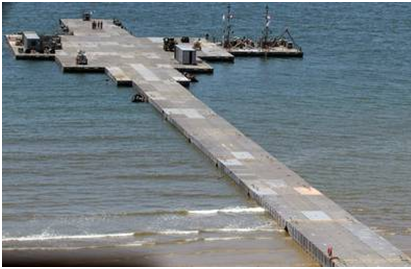
U.S. President Joe
Biden's plan to build a floating U.S. military port to speed up aid to Gaza
could take up to 60 days to become a reality and involve more than 1,000
American troops, the Pentagon said on Friday 8 Mar.
The Pentagon offered the timeline a day after Biden
announced the initiative in his State of the Union speech, as he seeks to cool anger in his Democratic Party
over his staunch support for Israel's offensive in Gaza since Oct. 7.
The United Nations has
warned that widespread famine in the Gaza Strip is "almost
inevitable" without urgent action. A formal conclusion that famine has
arrived in the coastal enclave of 2.3 million people could come next week. The
U.N. has said that once famine is declared, it is too late to help many people.
"Children in Gaza
cannot wait to eat. They are already dying from malnutrition and saving their
lives is a matter of hours or days - not weeks," said Jason Lee at Save
the Children.
Some U.S. lawmakers
and aid organizations said the floating pier system masked the bigger issue:
the failure to get Israel's government to allow more aid to enter Gaza by land,
which is the fastest, most efficient option.
"This is not a
logistics problem; it is a political problem," said Avril Benoît,
executive director for Médecins Sans Frontières (Doctors Without Borders) in
the United States.
"Rather than look
to the US military to build a work-around, the US should insist on immediate
humanitarian access using the roads and entry points that already exist."
Air Force Major General Patrick Ryder,
the Pentagon's chief spokesperson, described the planning for the port system
as still in its early stages, with deployment orders just starting to go out to
those troops who will head to the Middle East.
The Pentagon said it
had also not yet determined exactly how the landing site for the floating port
system would be secured against any threats and said it was in discussions with
partners including Israel. The U.S. port system being envisioned for Gaza
involves two separate components, the first being construction of a floating,
offshore barge that would be able to accept aid deliveries. The U.S. military would then move aid from
there to a floating, 1,800 foot-long (550 meter) causeway anchored to the shore.
Once operational, the
port system would allow delivery about 2 million meals to Gazans daily, Ryder
said.
By comparison, the
U.S. military has delivered a total of about 124,000 meals during four airdrops
in the past week. The latest airdrop on Friday delivered about 11,500 meals,
the U.S. military said.
While many of Biden's Democratic allies applaud the aid push, some
Republican lawmakers criticized it. "Building a port in Gaza is building a
port for Hamas," Republican Senator Marco Rubio wrote on X.
U.N. aid chief Martin
Griffiths on Friday described the United Nations role in the U.S. plan as
"limited at present."
"What we need for Gaza is of course an
immediate ceasefire, but we also need land routes. Land access is our primary
one, that's where you get scale," Griffiths said.